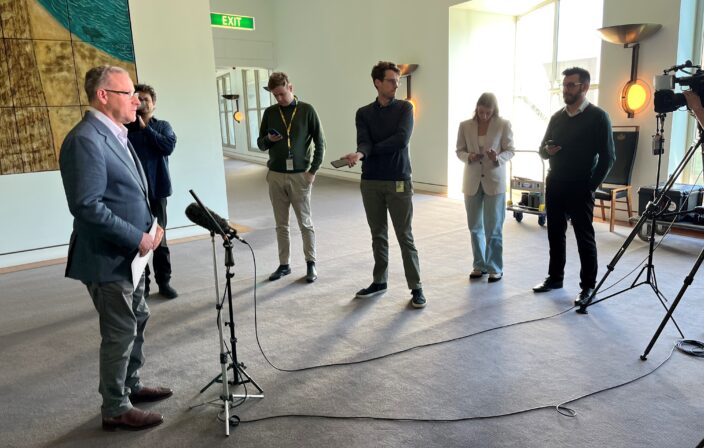Andrew McKellar interview with Kieran Gilbert, Sky News Afternoon Agenda
22 Aug 2022
|Transcripts
Event: Andrew McKellar interview with Kieran Gilbert, Sky News Afternoon Agenda.
Speakers: Andrew McKellar, chief executive Australian Chamber of Commerce and Industry; Kieran Gilbert, host Sky News Afternoon Agenda.
Date: 22 August 2022.
Topics: Jobs and Skills Summit, skilled migration, proposed low-skilled visa, skill and training investment, boosting workforce participation, aged pension income threshold.
E&OE
Kieran Gilbert, host Sky News Afternoon Agenda: Joining me now live in the studio is someone with a very keen eye on next week’s Job Summit. That’s Andrew McKellar, chief executive of the Chamber of Commerce and Industry. Andrew, great to see you as always. Matt Kean, the New South Wales Treasurer saying that there needs to be a big focus on stamping the passports to get skilled workers in, possibly a low-skilled worker visa. Do you support him in that?
Andrew McKellar, chief executive Australian Chamber of Commerce and Industry: Well, look, I think, it’s great to hear the New South Wales government saying that we’ve absolutely got to do something in this space. It’s a huge priority. I think the one note of caution I would signal here is I think at the moment, what we’ve got to be focusing on is making it easier for businesses to source migrants to come in and help address this skill shortage. So we’ve got to reduce the amount of red tape. We’ve got to be reducing the expense. I think we’ve got to be putting aside some of the priority lists for the time being. We’ve really got to get on with this rather than creating some new rules.
Kieran: So, while you support the sort of broad push from Kean, you also are supporting this discussion, this summit which the government clearly is putting a lot of energy into with various roundtables happening right across the country and throughout this week ahead of next week’s summit?
Andrew: Sure. There’s a lot of activity going on in the lead-up to the summit, but absolutely. Look, we think it’s a great opportunity to really kickstart a renewed reform process and to get some solutions to the challenges that we’re facing at the moment. But I think on something like migration, this is in the national interest, so let’s not tie it in knots. Let’s not add to the regulation. Let’s really try and get, I think, a quick solution and one that’s going to be effective at least for the next couple of years.
Kieran: And because that’s the point, isn’t it? You need the short-term response. But this migration question is one in terms of skilled migration which needs a longer-term piece as well, doesn’t it? Because we don’t always want to be having to plug gaps like this.
Andrew: No. Well, that’s right. I mean, we’ve had a problem which has been exacerbated by the past two years, the fact the borders have been shut and we’ve got to make up for that lost time and that lost ground. I think there are some immediate challenges we need fast solutions too. But then, of course, you have to have the long-term settings right. And I think next week’s an opportunity to address both those immediate priorities, as well as looking a little bit further into the future.
Kieran: You got the skilled migration. Obviously, that’s something that’s been in place for a long time. Matt Kean suggesting there should be a low-skilled visa as well. Do you support that?
Andrew: Well, I think there’s got to be flexibility. I mean, at the moment, there are labour shortages right across the economy. I think we’ve got to be careful about how far down we drill. But look, I think there’s got to be a sustainable, a credible skilled migration program, and equally we’ve got to invest in skills locally as well. So you’ve got to get that balance right.
Kieran: And there’s a lot more that can be done isn’t there in terms of equipping our young unemployed into areas where there are shortages? Because things like ICT or other courses that are out there, young unemployed can be equipped pretty quickly to take those jobs.
Andrew: Well, that’s right. I mean, there’s a full spectrum there. So whether it’s from traineeships, apprenticeships, they remain a critical part of the system. Right through tertiary education, the higher education system, we’ve really got to make sure that that skills system is equipping as many people as possible for jobs of the future, sustainable jobs.
Kieran: The prime minister suggested today that he is open, seemed to be indicating he’s open to the proposal as put forward by the opposition that pensioners should be able to work more hours before losing their benefits. I’m sure you’d welcome that.
Andrew: Very much so. We do think this is an issue. We are getting a lot of feedback from people 65 and over who do want to work more. But at the moment, the way the pension works, there’s a big disincentive. They start to lose that age pension very quickly if they are working more than, say one day a week. So we think there’s a lot of people who want to work two or three days a week. They want that flexibility as well as the lifestyle benefits. But at the moment, the system doesn’t really support that. So we think it’s an issue that absolutely needs to be on the table next week.
Kieran: Big couple of weeks ahead. Then you’ll be a part of it too, those talks. Andrew McKellar, chief executive of the Australian Chamber of Commerce and Industry, thanks as always.
Andrew: Thanks.


